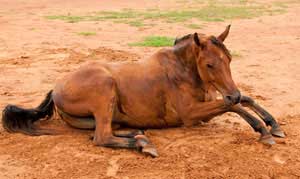Tips for Preventing Colic

Written by Preston Hickman, DVM, Wichita Equine and Sports Medicine
Colic is not a disease but rather a combination of signs to reflect abdominal pain in the horse. Colic is still considered the number one killer of horses in the United States and can range from mild to severe. Colic can become a life-threatening condition in a relatively short time and should never be ignored. Management plays a crucial role in colic prevention. The horse’s digestive tract and their anatomy seem to leave them more predisposed to colic than other species. Quickly and accurately recognizing colic signs and seeking qualified professional help will maximize the horse’s chances of recovery and reduce the risk of irreparable damage.
- Your routine should be established so that it occurs approximately the same time every day, (this includes feeding and exercise schedules).
- Excessive concentrates in the diet or energy-dense supplements have been linked to increased incidence of colic and therefore should be avoided.
- At least half of the horse’s diet should be from forage each day.
- Smaller rations and more frequent feedings are more in line with the way the horse maintains himself in the wild.
- Hay should be fed free choice throughout the day.
- A regular judicious parasite control program should be established.
- Fresh clean water should be available at all times.
- Horses still warm from exercise should not be allowed to drink excessive amounts of cold water.
- Horses should not be fed on the ground but rather in feeders.
- Hay bedding and pasture should be monitored for noxious weeds, foreign material and other toxic substances.
- Pay special attention to stress in your horse's environment. Changes in workload or when transporting make your horse especially vulnerable to colic.
Geographical location and regional differences from environmental factors such as sandy soil and climatic stress relate to the frequency and types of colic. All horses are susceptible to colic, and conscientious management is the best prevention.
About the author:
Dr. Preston Hickman practices veterinary medicine in Wichita, Kansas, specializing in equine podiatry and sports medicine. He combines traditional veterinary medicine with video gait analysis to diagnose physical problems and abnormal motion in horses. His experience as a farrier and chiropractor allow him unique perspective into biomechanical movement. Dr. Hickman has worked extensively with horse wellness issues as Assistant Medical Director for the Louisiana Racing Commission, overseeing four tracks and 16 veterinarians. Dr. Hickman has a background in mixed practice, equine and bovine veterinary medicine, as well as veterinary consultation to feedlots.


